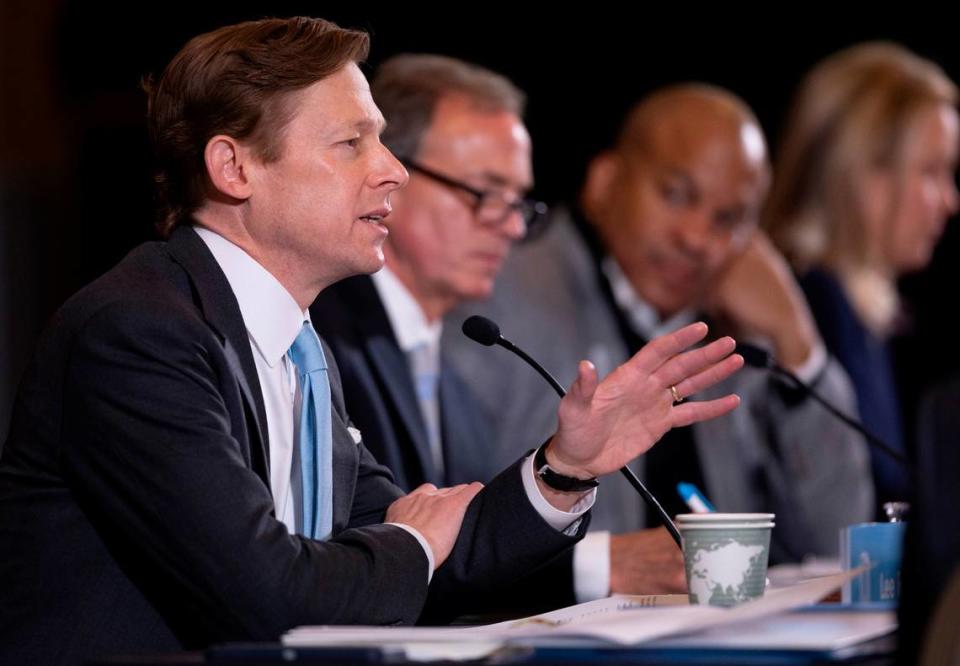Did Supreme Court ruling, free tuition impact applications to UNC? What numbers show
- Oops!Something went wrong.Please try again later.
Last year was a turbulent one for UNC-Chapel Hill, as the university was thrust into the national spotlight on separate occasions over its admissions policy and an on-campus tragedy.
But a statistic recently cited by the university’s interim chancellor could offer an early sign that those events and others don’t appear to have deterred prospective students from wanting to attend UNC.
Applications from students seeking to enter the university this coming fall are up a total of 15% compared to last year’s application cycle, UNC Interim Chancellor Lee Roberts said last week.
“That’s good news,” Roberts said of the increase at a media availability. “It means the university continues to attract students from all over the state and all over the world.”
Roberts also said the university can continue to improve its efforts to recruit students from across the state and from a variety of backgrounds.
The university had received about 67,000 applications at the time of Roberts’ remarks, compared to about 58,000 applications at the same point last year, UNC spokesperson Beth Lutz told The News & Observer. Lutz said the university was unable to confirm a specific number or provide additional context about trends in application numbers “until the admissions cycle is fully complete.”
The university didn’t say what kinds of applications were included in those totals, but the number it gave for last year was less than the total number of applications school reported that year, when it said it received more than 63,200 applications, including both first-year and transfer student applications.
In 2022, when the university received almost 57,200 first-year applications, it said at the time that the number was an all-time record.
UNC isn’t alone in seeing increases, in North Carolina or across the country. NC State University spokesperson Mick Kulikowski told The N&O that first-year student applications there are up 9% from last year, to 43,213. That’s the same year-over-year increase seen nationally, through Jan. 1, by the Common Application, a membership-based college application platform used by more than 1,000 U.S. colleges.
Post-Supreme Court initiatives at UNC
Roberts last week appeared to link the increase in applications this cycle, at least in part, to the initiatives former Chancellor Kevin Guskiewicz announced in the wake of last summer’s landmark Supreme Court decisions on affirmative action in college admissions, which overturned decades of precedent and prevented colleges from considering race as one factor in admissions.
Ahead of the decision, experts predicted that selective colleges — such as UNC, which was at the center of one of the cases, defending its admissions policy for nearly a decade before the court ruled it unconstitutional — might increase their focus on applicants’ socioeconomic status or geographic location in order to continue assembling diverse student bodies.
Roughly one week after the court issued the ruling, Guskiewicz announced that UNC would increase its efforts to reach students in “under-resourced” areas of the state by hiring additional “outreach officers” and offer free tuition to students whose families have an annual income of less than $80,000.
Roberts said Guskiewicz was “very intentional” about recruiting and communicating with students across the state, “whether demographically or geographically or otherwise.”

Roberts also noted the significance of offering free tuition to some students. That offer, which is being funded with money raised from donors, will be offered for the first time to qualifying students entering the university in the fall 2024 semester, who applied for admission this cycle.
“That’s an important part of making a Carolina education available to as many people as possible,” Roberts said. “So it’s not just outreach, there’s real dollars behind it.”
Improving recruitment efforts
Roberts sees room for additional improvement in the university’s efforts to recruit and attract more students, though.
In the wake of the Supreme Court decision, Roberts said, the university will need to ensure that students across the state and the country understand that UNC “is an institution for them, where they can belong, where they are welcome, and where they can be successful.”
The increased outreach efforts Guskiewicz led — hiring the additional outreach officers and taking faculty on tours of the state through the annual Tar Heel Bus Tour, among others — allow the university to have a physical presence in front of potential students, Roberts said. But the university will also need to reach students in other ways, he said.
“Since we’re talking about appealing to 17-year-olds, we need to do more online and, in particular, with social media and other forms of online media, just in telling the Carolina story and making sure that as many people as possible understand that this is a place for them,” Roberts said.
Roberts also noted that the number of students who apply to the university can vary widely by the county or area of North Carolina they are from. Some counties may have no students apply for several years, while others see thousands of students apply each cycle, he said.
The university’s current first-year class is made up of 4,700 students, with 93 of the state’s 100 counties represented among them.
Roberts said the university should “make sure that we’re getting a freshman class, an incoming class, that looks like our state.”
“We have one of the most dynamic, diverse, quickly growing states in the country,” Roberts said, “and we need to keep pace with that here.”
Students who applied to UNC this admissions cycle by the early-action deadline last November should receive their admissions decision by the end of January. Students who applied by the regular application deadline in mid-January should receive their decision by the end of March.

